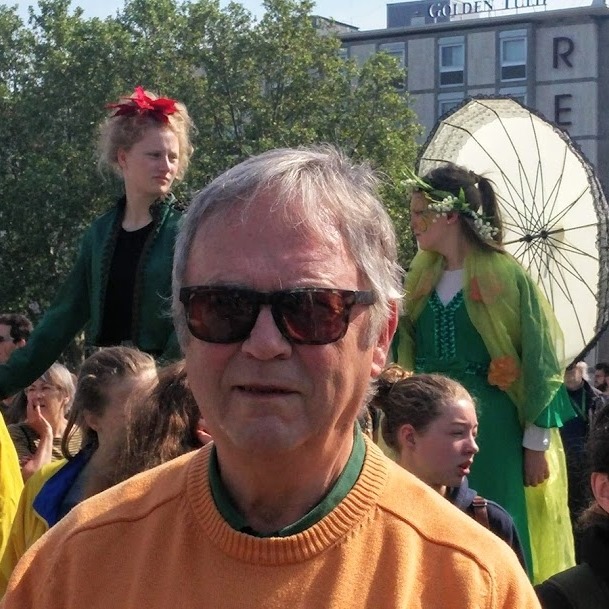That fundamental reassessment did occur, of course, and we can rely on Noam Chomsky's own prodigious scholarship to make this clear.
The first report prepared for LBJ (November 23) opened with this "Summary Assessment": "The outlook is hopeful. There is better assurance than under Diem that the war can be won. We are pulling out 1,000 American troops by the end of 1963." Apart from a serious budgetary deficit, the "main concern is whether the generals can hold together until victory has been achieved." The next day, however, CIA Director John McCone informed the President that the CIA now regarded the situation as "somewhat more serious" than had been thought, with "a continuing increase in Viet Cong activity since the first of November" (the coup). Subsequent reports only deepened the gloom. [Rethinking Camelot, 1993, p. 91.]
Re "Orwell's problem" (which is not trivial), the footnote to this paragraph refers to no less than 5 places in FRUSV IV (Foreign Relations of the United States, Vietnam 1961-1963) and FRUSV-64 I (Foreign Relations of the United States, Vietnam, 1964-1968) but without hyperlinks, even in the 2015 Kindle edition. Talk about "Orwell's problem"! Links would save readers (literally) hours of tedious searching.
The Pentagon Papers themselves are another case in point. The 2011 edition is now accessible on the National Archives website but it is organized differently than PP Gravel and consists only of PDFs, which are difficult to search, and the pagination is confusing (sometimes Arabic numerals, sometimes Roman numerals, sometimes letters). The Mt. Holyoke PP Gravel archive is preserved here, which is more easily searchable but does not include page numbers, so I will refer here to PP Gravel by page number since all five volumes are (fortunately) freely available at archive.org (also as PDFs).
About halfway through our almost six-year correspondence (1989-1995) Chomsky told me (July 1, 1992) that I had helped him "clarify the issues" to himself, which he hoped would show up in what he was writing - which turned out to be Rethinking Camelot (1993). Clarity for him was perplexing for me, though, because I could never get him to budge from his contention that Kennedy did not have a "withdrawal" policy but a "withdrawal after victory" policy. We went round and round about this, and looking back on it, I can see the adumbration of this dispute even in the earliest reporting.
The front page of the Pacific Stars and Stripes of Oct. 4, 1963 (I have a photocopy) had this banner headline: "U.S. TROOPS SEEN OUT OF VIET BY '65". The opening sentence was:
The White House said Wednesday night [Oct. 2] after hearing a report from a two-man inspection team that the U.S. military effort in the Republic of Vietnam should be completed by the end of 1965.
The NYT put the story on the front page on Oct. 3 (with the full text of the Statement on p. 4). The column headline was "VIETNAM VICTORY BY THE END OF '65 ENVISAGED BY U.S." The sub-head was "Officials Say War May Be Won if Political Crisis Does Not Hamstring Effort," and the "if" is reinforced in the opening sentence:
The United States said tonight [Oct. 2] that the war in South Vietnam might be won by the end of 1965 if the political crisis there did not "significantly" affect the military effort.
Headlines and first sentences, as every journalism student knows, are the most important elements of a news story, and in view of the argument that Chomsky was at such pains to make 30 years later, first with me and then in the book, the difference here is worth examining.
There is no conditionality in the Stars and Stripes version. In the NYT version, "envisaged" connotes a less concrete image than "seen" (you "see" an object in front of you, you don't "envisage" it), and the explicit condition ("if") is mentioned twice, once in the sub-head and again in the opening sentence (what grammarians call an "unreal" or "contrary-to-fact" condition). "Should" in the Stars and Stripes expresses probability (more than 50%). "May" in the NYT version expresses possibility (50%), and "might" expresses improbability (less than 50%).
If I had noticed this in 1992-93 when I was arguing with the most famous linguist in the world about the difference between a condition and an assumption, I would have pointed it out. But I'm sure his reaction would have been that the NYT's report was more accurate, because he was so convinced that the withdrawal plan was not based on the assumption of continuing military success but explicitly conditional on it.
The common-sense interpretation of the McNamara-Taylor Report, which was the basis of the White House Statement on the same day (Oct. 2) and of both JFK's NSAM 263 and LBJ's NSAM 273, is that continuing military success was an assumption, not a condition.
This is not rocket science. If I say, "Barbara is doing well in school and should graduate next year," I do not mean, "Barbara is doing well in school, but only if she continues to do well will she graduate next year..
Likewise, if I say, "The military campaign has made great progress and continues to progress (I.A.1) [and] it should be possible to withdraw the bulk of U.S. personnel by that time [the end of 1965] (I.B.2)," I do not mean, "The military campaign is going well but only if it continues to go well will there be any withdrawal of troops."
Chomsky never budged in his position that these documents (and others) make it absolutely clear that a withdrawal would only take place on the "explicit condition of victory," so that "withdrawal policy" can only be understood as a "withdrawal after victory" policy (cf. Rethinking Camelot, 1993 and 2015, passim).
Next Page 1 | 2 | 3 | 4 | 5 | 6
(Note: You can view every article as one long page if you sign up as an Advocate Member, or higher).





